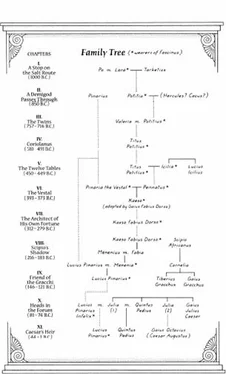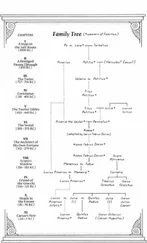Steven Saylor - Roma.The novel of ancient Rome
Здесь есть возможность читать онлайн «Steven Saylor - Roma.The novel of ancient Rome» весь текст электронной книги совершенно бесплатно (целиком полную версию без сокращений). В некоторых случаях можно слушать аудио, скачать через торрент в формате fb2 и присутствует краткое содержание. Жанр: Исторические приключения, на английском языке. Описание произведения, (предисловие) а так же отзывы посетителей доступны на портале библиотеки ЛибКат.
- Название:Roma.The novel of ancient Rome
- Автор:
- Жанр:
- Год:неизвестен
- ISBN:нет данных
- Рейтинг книги:5 / 5. Голосов: 1
-
Избранное:Добавить в избранное
- Отзывы:
-
Ваша оценка:
- 100
- 1
- 2
- 3
- 4
- 5
Roma.The novel of ancient Rome: краткое содержание, описание и аннотация
Предлагаем к чтению аннотацию, описание, краткое содержание или предисловие (зависит от того, что написал сам автор книги «Roma.The novel of ancient Rome»). Если вы не нашли необходимую информацию о книге — напишите в комментариях, мы постараемся отыскать её.
Roma.The novel of ancient Rome — читать онлайн бесплатно полную книгу (весь текст) целиком
Ниже представлен текст книги, разбитый по страницам. Система сохранения места последней прочитанной страницы, позволяет с удобством читать онлайн бесплатно книгу «Roma.The novel of ancient Rome», без необходимости каждый раз заново искать на чём Вы остановились. Поставьте закладку, и сможете в любой момент перейти на страницу, на которой закончили чтение.
Интервал:
Закладка:
He was conducted to a sunny garden with a view of the river. The garden was formally laid out, with manicured shrubs, gravel paths, and carefully pruned rose bushes. Tucked amid the shrubbery were quaint pieces of Greek statuary. Lucius noticed one of a winged Eros kneeling down to touch a butterfly, and another of a young boy absorbed in pulling a thorn from his foot. Lucius sat on a stone bench and gazed at the sparkles of morning sunlight on the river.
“You’re as pretty as a statue.”
Lucius stood and turned to see the queen standing nearby.
“Please, remain seated,” she said. “I was enjoying the sight of you. You looked like another statue in the garden: Roman Boy Contemplating the Tiber .”
“I’m not a boy, Your Majesty,” said Lucius, bristling slightly. “I would have worn my toga, but-”
“Roman men and their togas! I’m afraid they always look slightly ridiculous to me.”
“The men or the togas?”
Cleopatra smiled. “You’re a sharp one,” she said. “And of course you’re not a boy. I didn’t mean to offend you. I know how vexing it can be, when one is young but determined to be taken seriously.”
Cleopatra herself was no more than twenty-five. Her statue in the temple made her look older, Lucius thought, as had her royal raiment when he first met her. On this day she wore a simple, sleeveless linen gown tied at the waist with a gold-threaded sash. Her hair, usually pinned atop her head, hung down on either side of her face. She wore no diadem. The day was early, and the queen was not yet dressed for formal visitors.
“It’s good of you to receive me,” said Lucius.
“I could hardly turn away Caesar’s kinsman. Is there a celebration? My sentinels tell me that all sorts of people are out enjoying themselves along the river. Does it have something to do with Caesar’s pronouncement to the Senate?”
Lucius smiled at her mistake. “The Feast of Anna Perenna is an ancient plebeian holiday. It has nothing to do with me or with Caesar. He won’t be speaking to the Senate until later this morning.”
“I see. I have a great deal to learn about Roman customs. Perhaps you could instruct me.”
“I, Your Majesty?”
“By rights, the task should fall to Caesar. When he was in Alexandria, I educated him about Egyptian court protocol. But Caesar is much too busy. And there are so few people in the city I can trust.”
“But you’ve met many people since you arrived. All the best people come to the dinner parties here at your villa.”
“Yes, and they all go away utterly charmed by the queen of Egypt-or pretending to be so, to curry favor with Caesar. Occasionally, I receive word of their true reaction. That fellow Cicero, for example. To my face, the famous advocate was all smiles and flattery. Behind my back, he wrote a letter to a friend, complaining that he could hardly stand to be in the same room with me.”
“How do you know this?”
She shrugged. “One didn’t survive as a princess in Alexandria without learning how to discover the truth. Frankly, I don’t see why Caesar allows that man to keep his head. Didn’t Cicero oppose him in the civil war and fight for Pompeius?”
“Yes. Brutus opposed him, as well, but after Pharsalus, Caesar forgave them both. Caesar is famous for his clemency.”
The queen narrowed her eyes. “I suppose, operating in a republic, clemency was a tool of statecraft. Caesar will learn new ways to deal with his enemies when he finally puts the last vestiges of this primitive form of government behind him.”
“Primitive?” Lucius drew back his shoulders. More than ever he wished he had worn his toga; it gave a man a sense of authority. “Roma is much, much older than Alexandria. And I believe the Roman Republic predates the establishment of your dynasty by almost two hundred years.”
“Perhaps. But when my ancestor Ptolemy inherited control of Egypt from Alexander, he assumed the title, the royal insignia, and the divine status of the Pharaohs who preceded him. Their dynasties can be traced back thousands of years, to the very beginning of time. By comparison, the civilization of the Romans is very young; infantile, in fact. The great pyramids were built many centuries before the Greeks laid siege to Troy, and Roma was founded hundreds of years after Troy fell.”
She frowned. “The other day I hosted a group of Roman scholars, to discuss the holdings of the Library of Alexandria. We fell to talking about the origins of Roma, and they put forward a very novel theory. They said that a Trojan warrior, Aeneas, escaped the sack of the city, sailed to the shores of Italy, and settled near the Tiber, and thus the blood of Troy survives in the Romans. But when I asked for evidence, they had none. I have to wonder whether your scholars are taking a bit of license when they speak of this link between Roma and Troy.”
“There are those,” admitted Lucius, “who say that historians invent the past.”
Cleopatra smiled. “I would rather invent the future.”
She strolled to a place which afforded a better view of the water. Downriver, tiny in the distance, figures could be seen lounging on the bank. “We know so little of our ancestors, really, even we who can name them going back many generations. I suppose the Pinarii are an ancient family?”
“There was a Pinarius in Roma when Hercules appeared and killed the monster Cacus. And the Julii must be just as ancient. Caesar says the line was begun by a union with Venus.”
“Which makes Caesar almost as divine as myself. He certainly behaves like a god.” She smiled, then frowned. “While they are on earth, the gods do great things; but after they leave the earth, they fall as silent as dead mortals. I frequently pray to the first Ptolemy, who was most certainly a god; I speak, but he never speaks back. He fought beside Alexander, bathed beside him, ate beside him. There are a thousand questions I would like to ask him-What did Alexander’s laughter sound like? Did he snore? What did he smell like? — but to those questions there are no answers, and there never will be. The dead are all dust. The past is as unknowable as the future. When Caesar and I are dust, will men of the future know only our names, and nothing else about us?”
Lucius could think of nothing to say. He had never heard a woman, or a man for that matter, speak in such a fashion. Even Caesar tended to ruminate more about troop movements than about matters of eternity.
Cleopatra smiled. “It’s curious that I’m so young, and Caesar is so old-more than twice my age-while the relative ages of our kingdoms are reversed. Egypt is like a mature queen, wealthy, worldly, covered with jewels, sophisticated to her fingertips. Roma is a brawny, brash, brawling upstart. The two need not be at odds. In some ways they’re natural allies, as Caesar and I are natural allies.”
“Is that what you are? Allies?”
“To conquer Parthia, Caesar will need the assistance of Egypt.”
“But surely there’s more between you than that.” Watching her graceful movements, listening to her speak, Lucius had begun to see the attraction Cleopatra must hold for Caesar. He had also glimpsed the qualities that must have been so repellent to a man like Cicero, who believed in the staid, silent, matronly virtues of Roman womanhood.
For the first time, it seemed possible to Lucius, even likely, that Caesar intended to divorce his Roman wife. Caesar had a viable excuse: Calpurnia had failed to give him a son. If the king of Roma married the queen of Egypt, would Parthia be a gift to their son? What would become of Caesar’s other heirs?
A childish squeal erupted from the far side of the garden. Two handmaidens appeared, looking slightly chagrinned. Between them stood a tiny boy with upraised arms. The women held him by his hands, or more precisely restrained him, for he was eager to break from them and run to his mother.
Читать дальшеИнтервал:
Закладка:
Похожие книги на «Roma.The novel of ancient Rome»
Представляем Вашему вниманию похожие книги на «Roma.The novel of ancient Rome» списком для выбора. Мы отобрали схожую по названию и смыслу литературу в надежде предоставить читателям больше вариантов отыскать новые, интересные, ещё непрочитанные произведения.
Обсуждение, отзывы о книге «Roma.The novel of ancient Rome» и просто собственные мнения читателей. Оставьте ваши комментарии, напишите, что Вы думаете о произведении, его смысле или главных героях. Укажите что конкретно понравилось, а что нет, и почему Вы так считаете.











